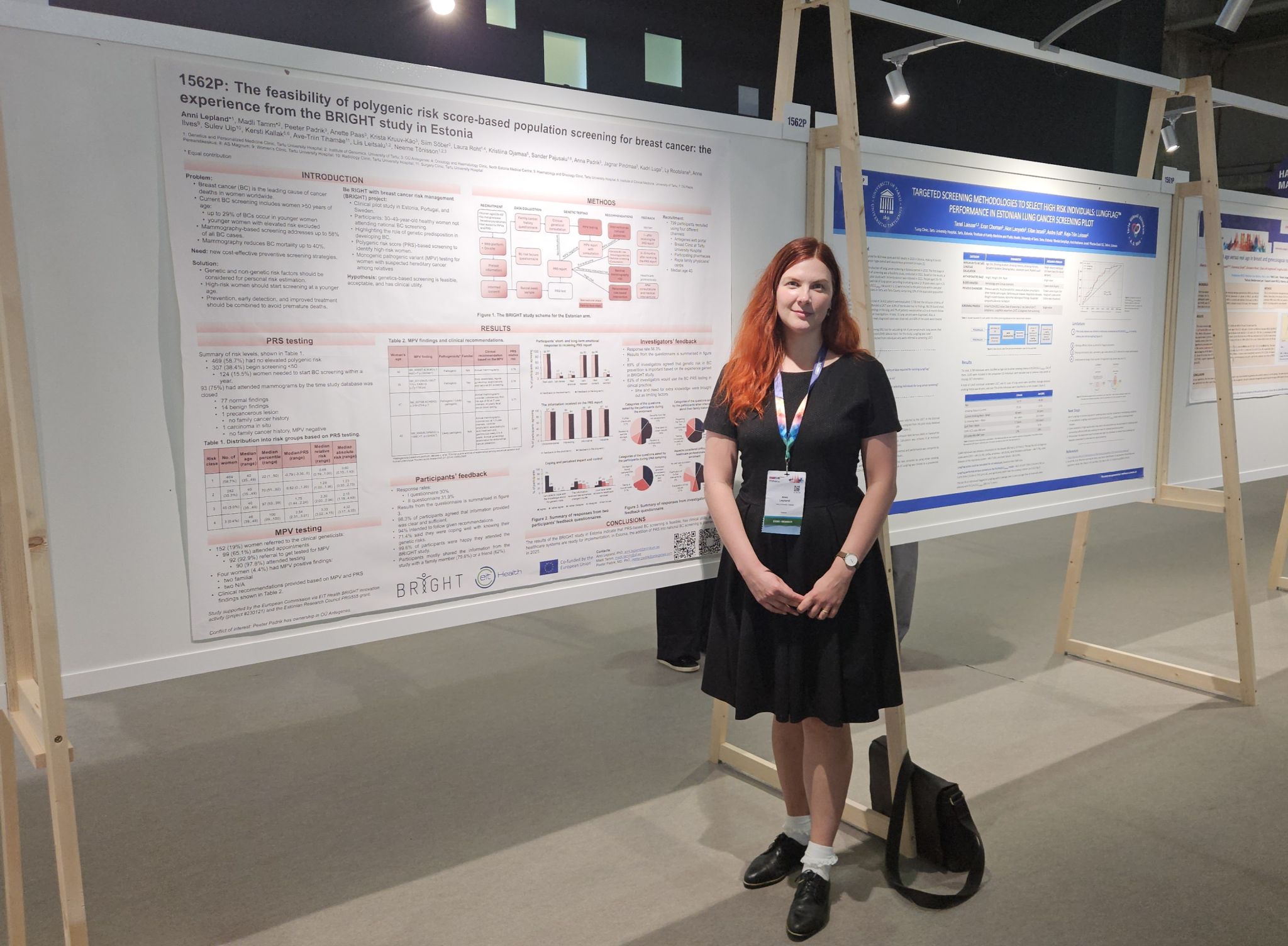The BRIGHT clinical study in Estonia, conducted by the University of Tartu, Antegenes, and Tartu University Hospital, confirms the feasibility and acceptability of polygenic risk score-based breast cancer screening from the perspectives of both participating women and healthcare professionals. The application of polygenic risk scores significantly enhances the assessment of genetic predisposition to cancer and modernises cancer prevention through personalisation in Estonia and other European countries.
Despite current screening programmes and personalised treatment approaches, breast cancer remains the most common malignant tumour among women and the leading cause of cancer-related deaths worldwide, including in Estonia.
The current screening programme considers only age and female sex as risk factors, yet women’s breast cancer risks vary significantly due to multiple factors, including genetic predisposition. In Estonia, screening begins at the age of 50, but one in five breast cancer cases occurs in younger women who may never reach the screening age. At the same time, the balance of benefits and challenges of including all younger women in the screening programme is insufficient to justify, and doing so would also incur excessive costs.
The aim of the international BRIGHT (Be RIGHT with breast cancer risk management) study, launched in 2022, was to assess the feasibility of personalised breast cancer screening based on genetic risk in women under the age of 50. This involved using the polygenic risk score (PRS) genetic test AnteBC, developed by the Estonian company Antegenes, as well as testing for monogenic pathogenic variants (MPVs) in local laboratories and the personalised medicine clinic at Tartu University Hospital. The study also evaluated the acceptability and satisfaction of this service model among both women and healthcare professionals.
The BRIGHT results in Estonia
In Estonia, 800 healthy women aged 35–49 were enrolled in the study between October 2022 and July 2023, either through the web portal, Breast Clinic, pharmacy, or primary healthcare centre. Participants received pre-test information and signed informed consent forms. Buccal swab samples were collected for DNA analysis, and participants completed two questionnaires on family cancer history and breast cancer clinical risk factors. One participant did not complete the questionnaires and was excluded from the analysis, resulting in a study cohort of 799 women with a median age of 40.
Before the clinical pilot study commenced in Estonia, several training sessions were conducted for the investigator groups.
Polygenic risk score (PRS) testing was performed for all participants using the AnteBC test (by Antegenes, Estonia).
- 469 (58.7%) of the participants had the same or lower breast cancer risk compared to the average risk in Estonia at the age of 50.
- A total of 330 (41.3%) were identified as having elevated polygenic breast cancer risk.
- Among these, 307 (38.4%) received recommendations to begin breast cancer screening before the age of 50.
- Of the 307 women, 124 (40.4%) were advised to start mammography screening in the current year and received referral notes.
By the time the study database was closed:
- 93 (75.0%) of the 124 women had undergone mammograms, resulting in one diagnosis of a precancerous lesion and one diagnosis of carcinoma in situ.
- Out of the 799 women, 90 (11.3%) registered for post-test polygenic risk consultations.
Based on the family cancer history questionnaire:
- 152 (19.0%) women were referred to a clinical geneticist.
- Of these, 99 (65.1%) attended appointments, and 90 completed monogenic pathogenic variant (MPV) testing.
- Four (4.4%) women tested positive for MPV, with one of these women also having elevated polygenic risk.
- All participants who underwent MPV testing received post-test genetic counselling.
Participant Feedback:
The response rate for the first feedback questionnaire was 30.0%, and for the second, 31.9%. Participants reported:
- Satisfaction with telemedicine solutions.
- Sufficient, clear, and understandable study information.
- Intent to follow the provided recommendations and the ability to manage knowledge of their genetic risks.
- Almost all participants (99.6%) were glad to have participated in the study and would make the same choice again.
Healthcare Professional Feedback:
The response rate for the healthcare professionals’ feedback questionnaire was 56.3%. Key findings include:
- 38.9% of respondents were unfamiliar with PRS testing before the study but found the pre-study training sufficient.
- Most (88.9%) considered genetic risk assessment important for breast cancer prevention.
- 83.3% expressed willingness to use breast cancer PRS testing in their clinical practice.
A cost-effectiveness analysis demonstrated that implementing this polygenic risk score-based model can prevent 15 breast cancer-related deaths per 10,000 women and is likely to be a good investment in public funding. Based on the findings of this study, it is recommended to integrate telemedicine solutions into the screening service model for both participant engagement and DNA sample collection. Such an approach makes breast cancer screening more accessible and cost-efficient, thereby improving breast cancer prevention and early detection.
In parallel, clinical studies under the BRIGHT project are ongoing in Sweden and Portugal, with approximately 800 women enrolled in each country. To support the implementation of risk-based breast cancer screening, a model analysis of this method is conducted in each country, including clinical benefits and cost-effectiveness assessments. The study is funded by the European Commission through the EIT Health organisation.

